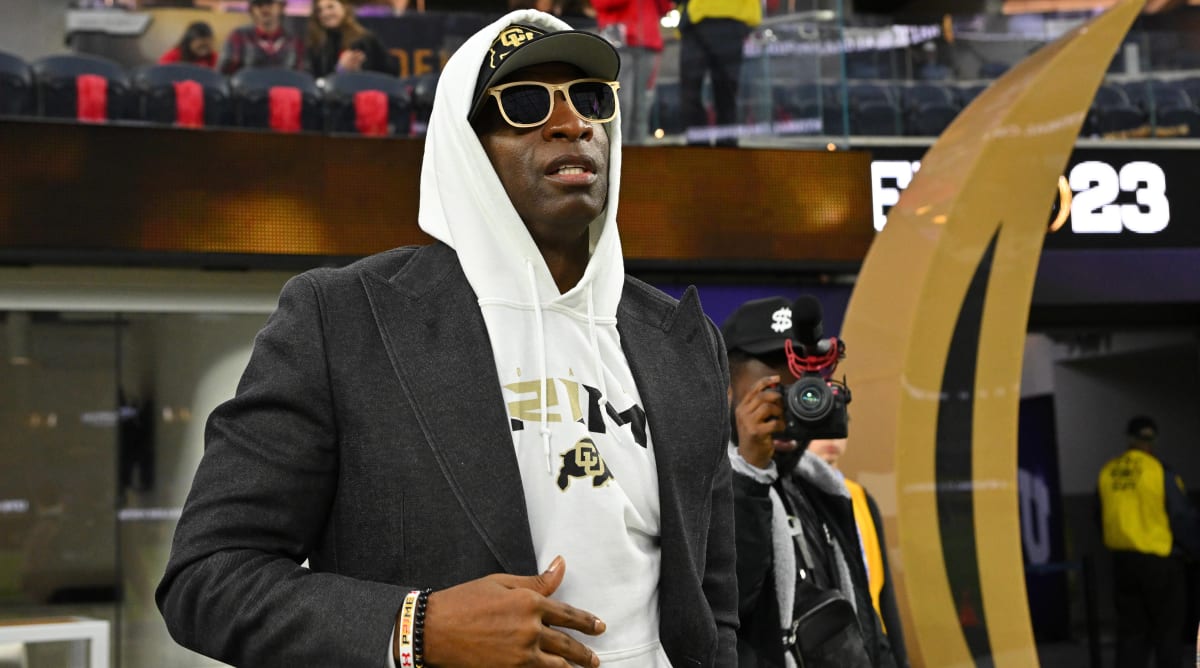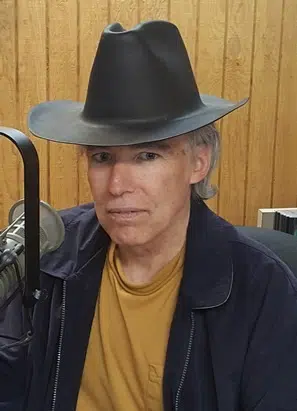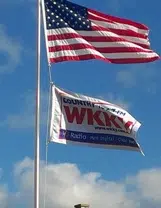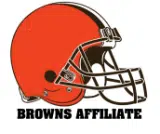From coaches to administrators, these individuals can sway the future of college athletics.
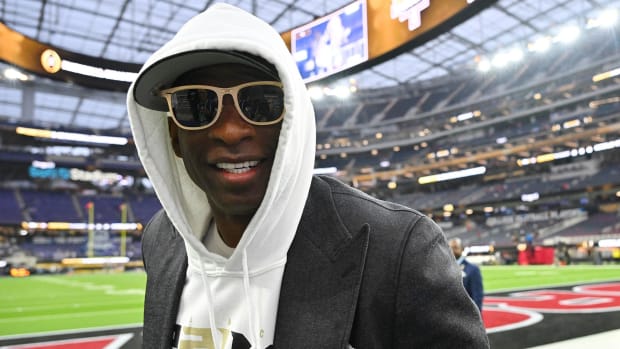
Jayne Kamin/Oncea/USA TODAY Sports
1. Deion Sanders (Colorado coach)
USC should be a College Football Playoff contender, but besides the Trojans, there won’t be a single program west of Texas with more eyes on it than Colorado as Coach Prime brings his talents to the Pac-12. It feels like anything is well within the realm of possibility for the time he’s there, from an extraordinary flameout to a conference championship (especially when USC and UCLA leave for Big Ten pastures). Sanders is a singular force of nature unlike anything we currently have in college football. Will the act wear thin if the wins don’t come quickly? Or will Sanders be able to keep a charm offensive going in Boulder for the long haul? The eyes of more than just the college football world will be on CU.
2. Mike Locksley (Maryland coach and founder of the National Coalition for Minority Football Coaches)
Few coaches have put their money where their mouth is like Locksley has as far as advancing coaching diversity. The organization he founded after brainstorming during the COVID-19 lockdown—the National Coalition for Minority Football Coaches—seeks to help level the playing field for minority coaches, who, despite being over 50% of the playing population in FBS football, are nowhere near that parity from a head coaching standpoint.
“We’re not here to tell people who to hire,” Locksley told Sports Illustrated in March 2022. “But what we are here to say is we do have minority coaches, and you keep hearing ‘We don’t have a pipeline,’ and that’s so not true. There’s so many coaches that are prepared with the tools necessary to lead programs but we just want you to put ‘em on the dance floor and give them a real opportunity.”
Besides its robust membership (over 1,500 coaches), the coalition’s stated goals are to prepare, promote and produce minority football coaches and administrators. One of the key ways they do so is through their academy program, which pairs a young minority coach with an established athletic director.
3. Ryan Walters (Purdue coach)
Walters had long been a rising star as a defensive coordinator with a system predicated on aggressive man defense. It was good enough for Eli Drinkwitz to keep him on when he took over at Missouri and for Bret Bielema to hire him for his initial staff in Champaign, where Walters coordinated one of the best defenses in the country in 2022. Now Walters has his own team after being courted by alma mater Colorado, and he remains in the conference to try to keep the Boilermakers viable as the league changes.
4. James Franklin (Penn State coach)
So far, the best bet to be the first Black coach to win an FBS national championship remains Franklin, whose Nittany Lions will likely enter the season as a dark-horse College Football Playoff team. The consistent roadblocks will stand in their way: Ohio State and Michigan, but a new quarterback and plenty of returning talent offers optimism that this is the year Penn State can get over the humps.
5. Brandon Collier (international recruiting)
Collier runs a recruiting organization called Premier Players International that helps colleges recruit football players overseas. Collier is a former linebacker at UMass under Don Brown who is based in Germany but crisscrosses Europe and beyond to help 150 players from 20 countries land Division I scholarships since 2017 at—among other places—Michigan, Penn State, Virginia, Notre Dame and Georgia Tech. PPI holds developmental camps in Europe and tours to the United States in the offseason.
“PPI has not only changed a lot of kids’ lives, but it has also changed my life, learning that I can impact so many kids by paying it all forward,” Collier says.
6. Kevin Warren (outgoing Big Ten commissioner)
Warren isn’t staying around for much longer in college sports, as he’ll soon take over as president and CEO of the Chicago Bears, but the move he presided over when UCLA and USC left the Pac-12 for the Big Ten will seismically change college sports forever, starting with football. Combining that and the $7 billion TV deal the league signed last summer, Warren’s three-year stopover at the head of one of the two true power conferences moving forward leaves a legacy as a tremendous change agent. And his reputation has come a long way from 2020’s apparent ineptness surrounding COVID-19 and response to SEC realignment. There may be some within the league who will always hold his missteps against him, but they certainly won’t be complaining about the television money coming their way once the checks start clearing.
7. Gene Smith (athletic director, Ohio State)
Smith is without question one of the most influential administrators in college sports, and he’s been head of Buckeyes athletics since 2005. Much like successful coaches often have coaching trees, so does Smith. ADs at Washington State (Pat Chun), UCLA (Martin Jarmond) and Pitt (Heather Lyke) all worked under Smith in Columbus, as did Big Ten deputy commissioner Diana Sabau. Could Smith have gone beyond Ohio State? Certainly. But for now he’s said publicly he has no interest in the role Warren just vacated.
8. Martin Jarmond (athletic director, UCLA)
Jarmond presides over a UCLA athletic program that will experience quite a bit of change as the Bruins head to the Big Ten along with USC. Jarmond has also gotten the school from Under Armour to Jordan brand and extended football coach Chip Kelly, who’s building the Bruins consistently.
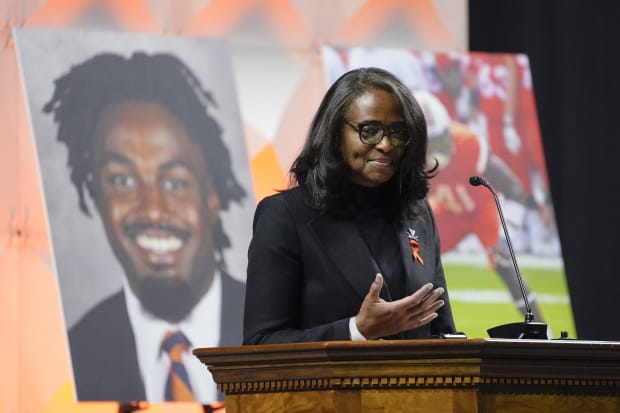
Steve Helber/USA TODAY Sports
9. Carla Williams (athletic director, Virginia)
Williams took over in 2017 and hired Tony Elliott—the first Black head football coach in school history—but the most recent test of her leadership came as she worked with Elliott to support the team and the rest of the campus as they attempt to heal and move forward from the deaths of football players Devin Chandler, D’Sean Perry and Lavel Davis. Far beyond wins, losses, or facilities, how she assists in the healing process is the true mark of her work as an administrator.
10–13. Power 4 HBCU commissioners
- Jacqie McWilliams Parker (CIAA)
- Charles F. McClelland (SWAC)
- Anthony Holloman (SIAC)
- Sonja Stills (MEAC)
The four HBCU leagues have recently come together to find ways in which it makes sense to partner across sports and commercial lines. In some ways they already do, like with the preseason MEAC/SWAC challenge and the postseason Celebration Bowl, which the SIAC and the CIAA are exploring ways to mimic at the Division II level. Another action item for the MEAC and SWAC is also making sure the price of out of conference games in all sports (but especially football) has a firm floor on it so schools don’t undercut each other inadvertently.
“I think we’re for power,” McWilliams Parker says. “That’s what we stand for. To empower our students, our HBCU institutions, to advocate, to live our best lives in the communities that we serve and give these student athletes an opportunity to play at HBCUs. And it’s not for everyone. We get that as well. But for us, it’s what I do every single day. It’s passion work.”
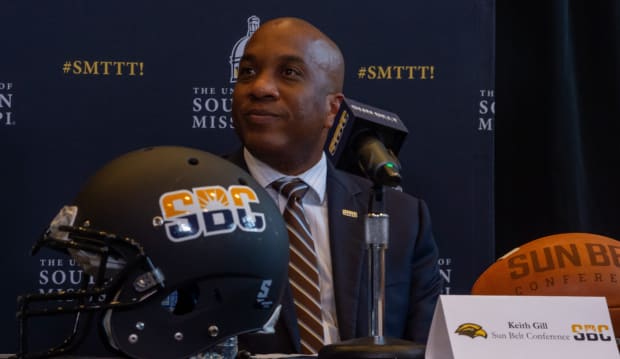
Dominic Gwinn/Hattiesburg American/USA TODAY NETWORK
14. Keith Gill (Sun Belt Conference commissioner)
As the realignment landscape changes the sport at many levels, Gill has the Sun Belt in a position many of the other mid-major leagues in college football envy: It’s stable with parity and a regional identity with a bedrock of good football. That regional identity is particularly important as the league has leaned into rivalries and the passion that they bring to organically create buzz about the league and keep fan bases engaged because the footprint isn’t so far-flung. The Sun Belt sits in a great position currently in a future that still seems all-too uncertain.
15. Christian Carter (agent)
Carter is a young agent for the firm Coaches Inc. and is carving out a name for himself representing players and coaches including Baylor running backs coach AJ Steward, Arizona State receivers coach Ra’Shaad Samples and former college coach Thomas Brown, who interviewed for multiple NFL head coaching jobs while an assistant for the Los Angeles Rams. The college coaching agency landscape is dominated by a small number of firms, but Carter is carving a niche for himself in particular representing Black coaches who are often under-represented with skills that are under-leveraged as many Black assistants, especially on offense, don’t get coveted roles as QB coaches or play calling offensive coordinators that are seen as the most direct pipelines to a head coaching job.
16. Erik Moses (executive director, Fiesta Bowl)
Moses is new to the job after a stint running the Nashville Motor Speedway, but he has hit the ground running in his new home running one of the more prestigious bowls on the calendar. As the Playoff system expands, it’s on Moses to preserve both the experience the bowl has pulled off so well for five decades for the players but also the community the game serves year-round.
“I’ve talked to guys that I know in [the NFL] who have played in the Fiesta Bowl and other bowl games, and they speak of those experiences fondly,” Moses says. “I guess what I’m saying is my fear for college football is that it does not become the NFL-lite. That’s not what we need it to be. It’s the pageantry, the affinity we have for these schools, the rivalries, all of those things are what makes college football so special.”
17. John T. Grant (executive director, Celebration Bowl)
In addition to its preseason sister event, the Meac/SWAC challenge, Grant runs the crown jewel of HBCU football in Atlanta, where on national television the best of the MEAC and SWAC meet to decide the Black national championship. Grant and ESPN Events (which owns the game) have backed the event with a $1 million payout to each league, consistent corporate sponsorship and keeping its time slot, format and location consistent to build over its eight-year history.
18. Stephen Gaither (founder of HBCU Gameday)
There is a proud history of Black-owned newspapers and media companies that cover the HBCU landscape for as long as they’ve been around, but in 2012, Gaither founded HBCUGameday.com, which covers HBCU sports with a depth, knowledge and passion for the games and the culture surrounding them. HBCU Gameday’s multiplatform approach to coverage and the amount of it serves fans just about everything they can ask for about their team.
19. Ramogi Huma (executive director for the National College Players Association)
Huma has been a tireless advocate for the interests of NCAA athletes, chief among them is the fight for unionization rights from his time organizing Northwestern athletes in 2015 to now, with an unfair labor practice charge against USC, the Pac-12 and the NCAA that is in front of the National Labor Relations Board’s Los Angeles region. The current general counsel of the NLRB has signaled that under her watch, she’s more open to ruling in favor of college athletes, and the case is one of multiple to watch as the NCAA continues to fight legal battles on all fronts.
20. Paul McDonald (lawyer for the plaintiffs in Johnson vs. NCAA)
Speaking of court cases, McDonald is currently arguing one in the third circuit where his clients, led by a former Villanova football player named Trey Johnson, is suing the NCAA for the right to run a multifactor test that would hopefully deem college athletes employers of their schools and the NCAA jointly, and able to make at least the minimum wage based on the hours they practice and compete. The case had a recent hearing and still has numerous legal hoops to jump through to be decided (perhaps the case may even end up in the Supreme Court’s hands), but if the plaintiffs prevail, the NCAA’s longstanding arguments regarding amateurism will finally meet their match.
“You have all these other people on campus who are doing chores or tasks that don’t require a lot of heavy lifting,” McDonald says. “And then you got these athletes that are not just generating money in the big revenue sports but generating identity for the university. Everything about a university’s identity is wrapped up in the sports program. When people think of their alma mater, they think about themselves with the mascot and the program.”




